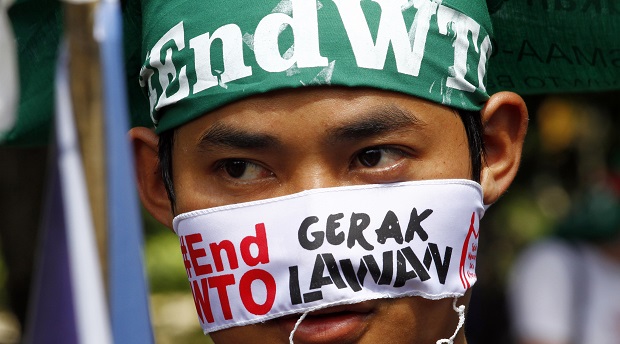
An activist wraps his face during a protest against the World Trade Organization meeting in Bali, Indonesia on Tuesday. Indonesia is hosting the World Trade Organization Ministerial Conference from December 3 – 6. The word ‘Gerak’ means movement. AP
NUSA DUA—The WTO launches a frantic drive on Tuesday to salvage its floundering efforts to liberalize global trade at a summit laced with potential make-or-break implications for the body’s global influence.
WTO chief Roberto Azevedo implored trade ministers to reach a modest agreement on key trade issues on the Indonesian resort island of Bali, in hopes it will keep alive a stumbling 12-year-old effort to slash international trade barriers.
“It is there for the taking. It is a matter of political will,” Azevedo said during an appearance ahead of the four-day summit’s opening at 3 p.m. (0700 GMT).
In an opinion piece in the Wall Street Journal, Azevedo called the 159-member group’s gathering “the most important World Trade Organization meeting in years”.
“At stake is not only a package of measures to boost the global economy… but also the role of the WTO and the multilateral trading system in global economic governance,” he said in an editorial in the Wall Street Journal.
In 2001, the WTO launched the “Doha Round” of talks in Qatar, seeking to overhaul the world trading system by setting a global framework of rules and tearing down barriers.
Various estimates say it could create tens of millions of jobs and perhaps $1 trillion in new economic activity.
But protectionist disputes between rich and poor countries — as well as the WTO’s insistence that any accord be unanimous — has made a deal elusive.
Retreating for now from Doha’s lofty aims, the WTO has instead put forward a limited “Bali package” on specific issues.
Azevedo hopes an agreement on that package can keep the Doha Round on life-support for a later push.
But the Bali measures have hit snags, most notably India’s insistence that it be allowed to offer subsidies to its millions of poor farmers to keep food prices down.
“We can no longer allow the interests of our farmers to be compromised at the altar of mercantilist ambitions of the rich,” Commerce and Industry Minister Anand Sharma, who leads India’s delegation, was quoted as saying on Monday by Indian media.
Many now see the troubled WTO effort as threatened by alternative regional pacts between major trading nations including the 12-nation Trans-Pacific Partnership (TPP) pushed by Washington.
Those “offer no substitute for global agreements and global rules” such as the Doha Round that take into account the interests of the world’s poorest countries, Azevedo wrote.
He said the consequences of failure in Bali would be “grave” at a time of world economic uncertainty.
Ministers will be focusing in Bali on agricultural subsidies, proposals to simplify customs procedures, and measures to aid least-developed countries.
Past WTO ministerial conferences have been accompanied by violent anti-globalization protests.
In Bali on Tuesday, about 400 protesters called for the WTO to be disbanded in a demonstration organized by agricultural and fisheries NGOs from several countries.
Holding a coffin symbolizing the trade body, they marched on a government office complex in Bali’s capital Denpasar shouting “TPP, no! Shut down WTO, NOW!”
“WTO is the source of hunger in this world, the loss of jobs for many farmers,” said Hendry Saragih, one of the organizers.
“It is the destroyer of the global food system and benefits only industries that come from industrialized countries.”
There was no violence, however, and tight security promised to keep any demonstrations far from the conference venue.
Indonesia’s Trade Minister Gita Wirjawan, chair of the conference, said his counterparts seemed “optimistic” about a deal.
“This is probably the best chance that we have of striking a deal among all 159 countries. Let ourselves not be held hostage to divergence between one another,” he said.

